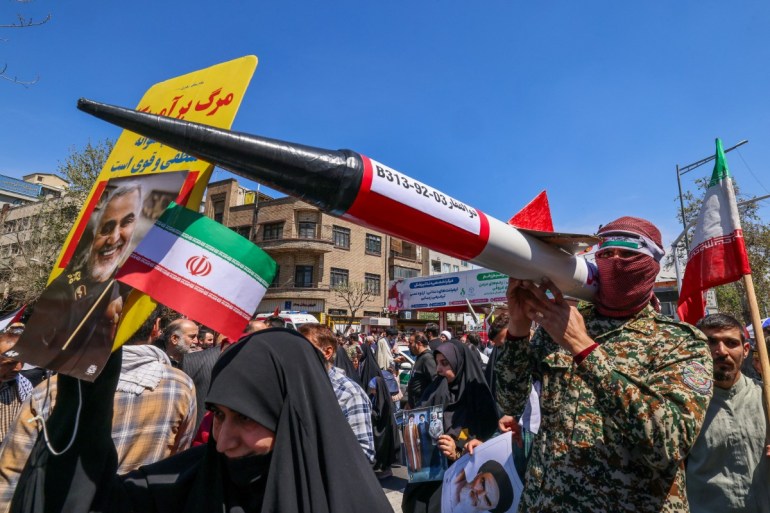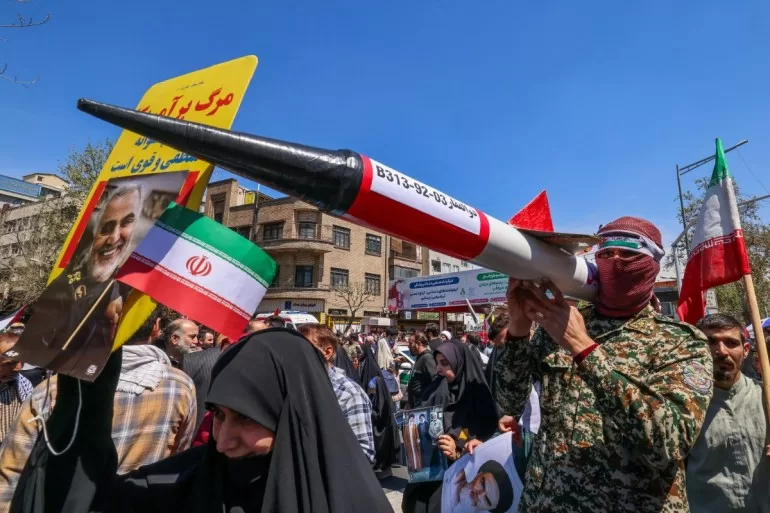According to the Israeli army, 99 percent of the projectiles were intercepted by its jets and those of its allies, including the United States and Jordan. Others were stopped by Israel’s Iron Dome missile defence system, acquired and operated with US help.
While Western diplomats and US President Joe Biden have reportedly told Israeli Prime Minister Benjamin Netanyahu they will not support further retaliation, some analysts suggest that last night’s strikes may be part of a wider ploy to draw the US, Israel’s close ally, into a broader regional war.
Laying the foundation on April 1?
In determining how Israel may respond to the overnight attack, analysts have focused on Israel’s own attack on the Iranian consulate on April 1.
That strike, which killed two Islamic Revolutionary Guard Corps (IRGC) generals and five officers, was carried out with scant regard to Israel’s allies, who were only notified shortly ahead of the attack, according to at least one analyst Al Jazeera spoke to.
Hamidreza Azizi, a visiting fellow at SWP Berlin, outlined two scenarios, both resting upon the motivations behind the Israeli attack on the Iranian consulate.
In the first scenario, the Israeli strike occurred with little or no thought given to the consequences. In the second, the strike was a deliberate attempt to draw Iran into regional war and shift US and Western focus away from Israel’s war on Gaza and towards the regional bogeyman, Iran.
In both scenarios, US involvement would be critical.
Despite its status as a regional superpower, Israel – overstretched by six months of war on Gaza – would stand little chance against Iran’s standing army of at least 580,000, supplemented by some 200,000 trained reserve personnel, divided among the army and the IRGC.
“Netanyahu’s plan is clear, to distract attention from the war in Gaza and to drag the US and other Western allies back into the Middle East,” Nomi Bar-Yaacov, an associate fellow at Chatham House, said.
“Given the close relationship between Israel and the US and Israel’s dependency on US aid, Israel should have informed the US that it was planning to attack the Iranian consulate building where the IRGC is based.
“By not doing so, Israel crossed a red line. Israel’s motives … need to be questioned. An attack on a foreign consulate constitutes a strike on foreign soil under international law, and it is clear that Netanyahu knew he was crossing the line and that Iran would respond with force,” she said.

For years, Iran has maintained steady pressure on Israel through its proxies, not least Hezbollah in Lebanon, which has maintained an exchange of fire with Israel dating back from before October 7.
Eyes on the prize
Netanyahu’s motivations for attempting to claw the US into the war likely run deeper than Israel’s interests alone, analysts say, and likely speak to concerns closer to his heart.
Polls in Israel show the prime minister’s popularity to be at a critical low. After Netanyahu built his reputation upon claims that only he and his Likud Party stood between Israelis and oblivion, the surprise attack by Hamas-led fighters on October 7 has severely damaged his standing.
“Israel’s options are most impacted by how Netanyahu, who is embattled domestically and internationally, will choose to take advantage of Western sympathy for Tel Aviv following Iran’s highly telegraphed attack,” said HA Hellyer, an authority on Middle East security at the Carnegie Endowment for International Peace and the Royal United Services Institute.
In the months leading up to October, popular discontent with Netanyahu was growing after his extreme right-wing government attempted to force through changes that would hobble Israel’s independent judiciary.
In the months since October 7, protests have been growing against his handling of the war on Gaza as he is perceived to be less than interested in securing the release of the remaining captives taken from Israel in the attack.
The protests, in addition to swelling, have developed into demonstrations against him and his rule.
Even the US seemed to have lost patience with Netanyahu, with a highly publicised invitation issued to Benny Gantz, a member of Israel’s war cabinet, to visit Washington, DC for talks.
Netanyahu has worked to regain lost ground, using every opportunity to position himself at the forefront of a surge of nationalism that makes many people in Israel reluctant to call for an end to the war.
‘A tipping point’
However, irrespective of how Israel chooses to portray itself in this latest clash, it is the US staging the play.
“What we have heard so far is that the US has no interest in a war and are signalling that there will be a unified diplomatic response to Iran from the West, while at the same time calling for restraint,” Azizi said.
With the US’s signalling, Netanyahu’s gambit looks in jeopardy.
“We are at a tipping point and the only solution is diplomatic,” Bar-Yaacov said. “A harsh military response risks dragging the region into further turmoil.”
Diplomatically, Israel’s response to the attack has mirrored that of its reaction to the earlier one, with its ambassador to the United Nations calling for a UN Security Council meeting on the matter, once again trying to marshall international opinion behind Israel, despite this latest strike being a response to Israel’s own.
Moreover, with Iran looking less likely to suffer any cost for its strike upon Israel, he risks widening the divisions in both his own cabinet and in Israeli society if no action is taken.
“If [Netanyahu] thinks DC will reject backing an assault on Iran itself, then attacks on scores of proxies simultaneously could be an alternative option,” Hellyer said.
